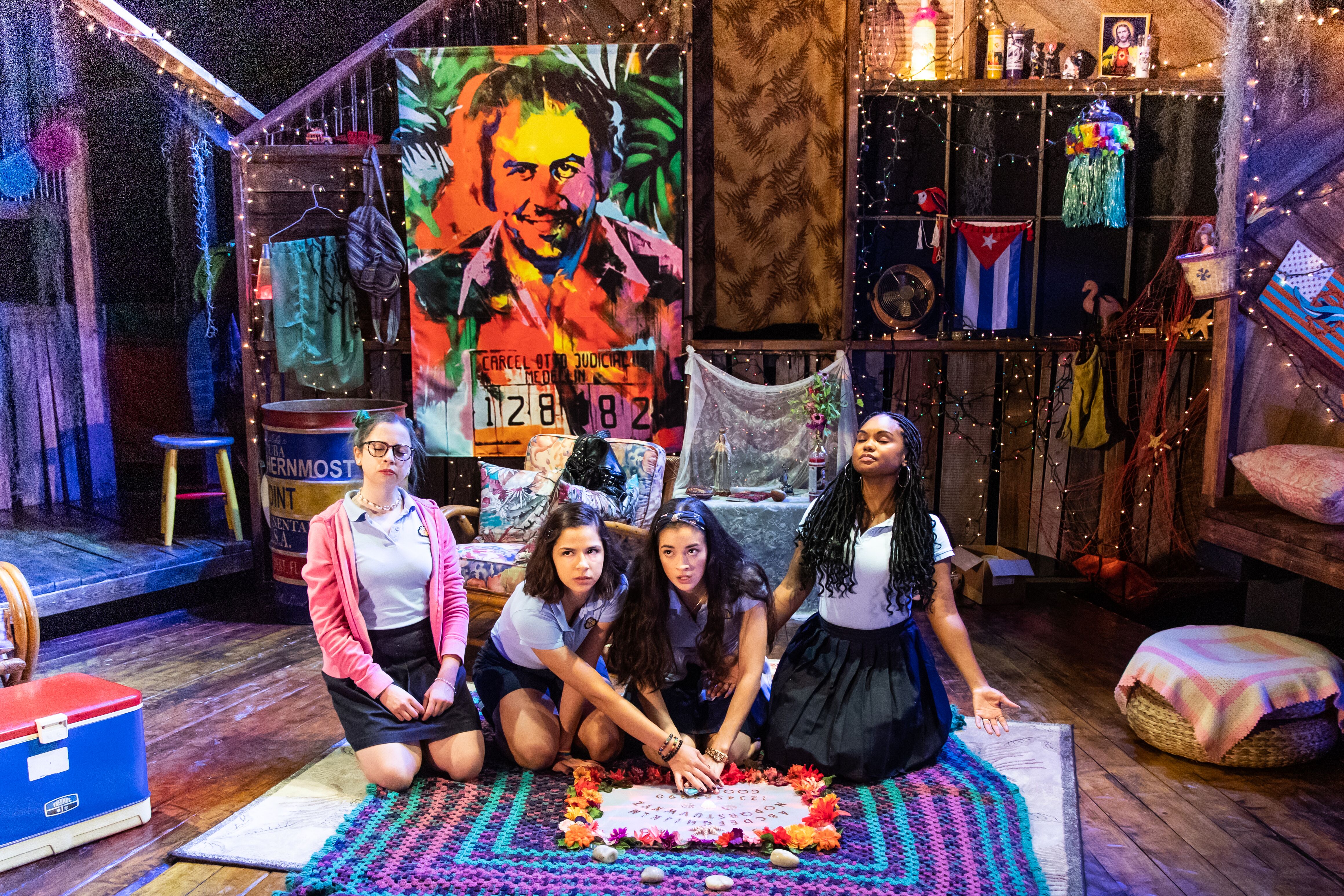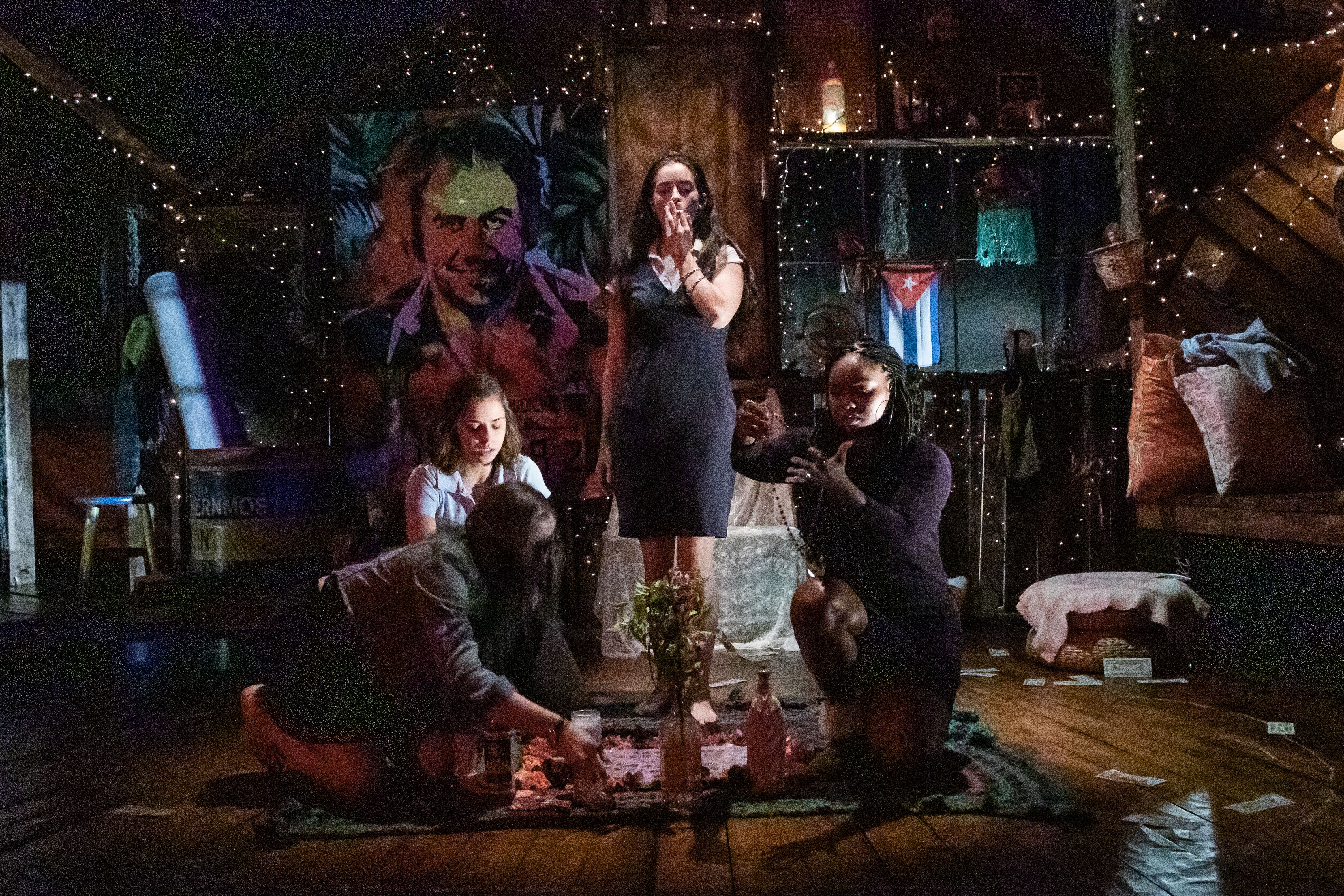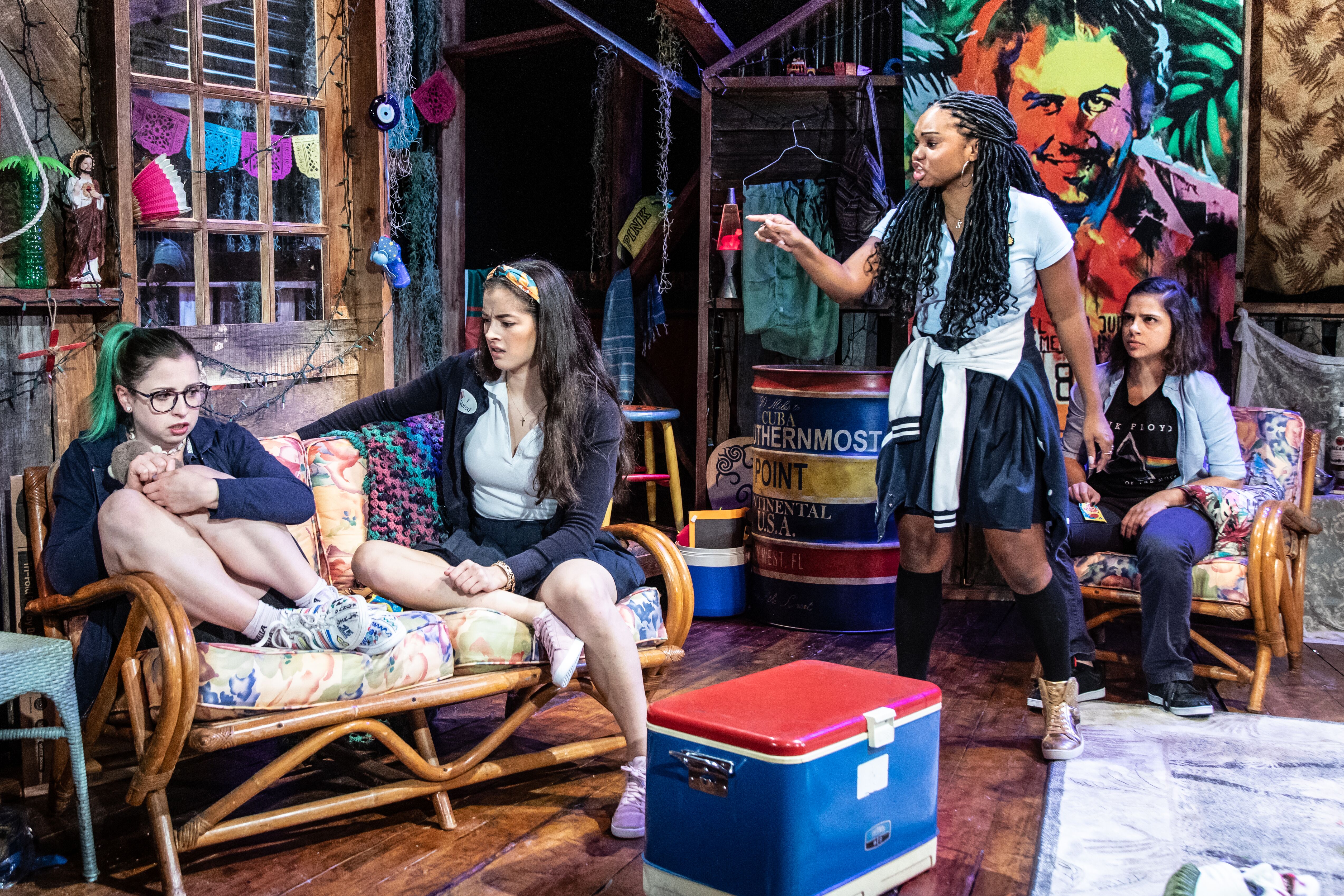When I saw Our Dear Dead Drug Lord — a play about a group of teenagers in Miami who search for social footing, process personal traumas, and figure out what the true meaning of sacrifice is by trying to summon to spirit of Pablo Escobar — my first thought on leaving the theater was, Oh, this play is super Jewish.
Sure enough, Alexis Scheer, the Boston-based playwright whose show runs through January 5 at WP Theater in New York City, is a Jewish Colombian writer devoted to extolling the virtues of the teenage girl.
“I love teenage girls,” Scheer told me recently, after I was done gushing to her about her play. “I think about teenage me a lot. I’ve felt 30 since I was 12.”
Scheer treats the four teenage girls at the center of Drug Lord with seriousness and respect, even as they make mistakes and maybe some less-than-stellar decisions. They kiss each other’s boyfriends and call each other names; they get defensive when told they only parrot their parents’ politics instead of forming their own; and in an attempt to understand their place in society as they come of age in 2008 Florida, they experiment with ritual in such a visceral way that you’re not sure if they’re going to destroy themselves or ascend to some greater form of being. And yes, they also obsessively study Pablo Escobar, a Colombian cartel leader whose violence ravaged the city of Medellín and changed the history of the Colombian state.

Scheer’s characters gravitate toward Escobar because he was a cunning, mysterious person who went outside conventional hierarchies to take power. “I’ve been thinking about young women who are trying to look for power and they don’t know where to look, and then they look in the wrong place,” Scheer says. She then subverts our expectations by having us realize, “This isn’t the feminist, empowerment thing I thought it was gonna be. This has a different edge to it.”
We spoke recently about making art with an edge, infusing theater with Jewish ritual, and telling authentic Jewish Latinx stories.
This interview has been lightly edited and condensed.
When I saw Our Dear Dead Drug Lord, I thought it was such a Jewy play, especially with the theme of being “chosen.”
As a Jewish person, I think we all hear it a lot growing up; it’s kind of this endowment. “We are the chosen ones.” At a young age, it has this kind of Harry Potter quality. You don’t know what it means, but you know that you’re like, burdened with glorious purpose!
In the play, Zoom, my Jewish character, she’s showing off. She’s at that age where she doesn’t know what it means, she doesn’t have the thought to question it. Growing up as a Jewish person and growing into my Jewishness, I’ve learned that where I really resonated with Judaism is the active art of questioning. I feel like Zoom is stuck in the Harry Potter version of “I’m chosen.”
This is a very spiritual play. Are you attracted to ritual in your own life in a similar way?
I have a pretty rich spiritual life. Judaism is a ritual, and the culture, the things I grew up with, the values, I carry all that with me. Now as an adult, the New Age witchcraft thing is a scene I’m very much a part of. My mom is an astrologer. Figuring out how all these things talk to each other — this sounds so basic, but I love the idea of namaste, the divine in me recognizes the divine in you. It’s so simple, but to me it circles back to this idea of being “chosen,” and expanding your thinking to think that everyone is chosen. I think of the theater as a very holy place where people come to commune and be changed or transformed. The ritual of going to the theater does feel spiritual in itself.

Personally, I have one Jewish parent and one parent who isn’t Jewish, and there are definitely spaces where you’re told to prioritize one part of your identity over another, even in creative fields. What have your experiences been working with different aspects of your heritage in your creative material?
You can’t be something that you can’t see. Fifteen years ago, I didn’t know that I could be a playwright. I thought, “What is a playwright? Oh, it’s a dead white guy.” In the last few years, we’ve seen this great wave of young women have these really amazing plays come to the scene and be widely regarded. Seeing women in their 20s and 30s having careers as playwrights was kind of like, “Oh yeah, I’m what a playwright looks like. I can give myself permission to do that.” I write a lot of characters who are Colombian and Jewish simply because that’s who I am.
Thinking about all the Jew-ish media that we have right now, that’s supposed to be about Jews but there’s still so much that’s stereotypical or not authentic, I’m wondering what it means to you to have this platform to tell authentic stories?
I’m not gonna be the voice for all Jewish people, that’s impossible. I can’t be the voice for all Latinx people. That kind of thinking can be really debilitating. I remember when I first started having the courage to write all these Latinas onstage, I was like, “Am I allowed to do this? I’m only half Colombian, how dare I speak for a whole group of people.” I relaxed into the idea that no one else is going to tell my truth, and there’s space for everyone to tell their truth. I try not to get too stuck in labels and just try to remember that at the end of the day, I’m just writing for myself and younger me. I think about trying to write stories that teenage me would’ve identified with.
When you’re a teenage girl, trying to be taken seriously immediately makes people not take you seriously. What attracts you to writing about teenage girls?
I think they’re so smart. At every point in my life, I’ve felt the oldest I’ve ever been. It’s about recognizing that 16-year-old me knew everything she could know as a 16-year-old and trying to really give that honor. I love writing coming-of-age stories because I think we never stop coming of age, we’re always growing. There’s something exciting about teenagers because they don’t have inhibitions, they don’t overthink things the way we do, they don’t have control of their hormones the way we do. Things are very high stakes and life-or-death, which is very fertile ground to write stories and create relationships from.

The play ends in violence and then a sort of coming to peace with it, and I was grappling with it afterwards. The world is violent against women, we walk around bracing ourselves for violence. What was your process in choosing to show violence that was against women, but was also about speaking truth to power?
I think when you are crafting moments of intimacy, whether passion or violence, you just think very carefully about what is this, why is this onstage, how are we changed by this? From the beginning of the play, the girls have only been trying to do one thing: commune with the spirit of Pablo Escobar. Which, when you think about it, is dark magic. So I had to think about, okay, what is the cost? This has the cost of something real. I think especially in communities of color, you do have all of these rituals that are sacrificial.
I did some research on violence that’s female-on-female, like genital mutilation, and realized, This is trying to get close to God. This is trying to be more holy. That changes the flavor of the viciousness of it. And thinking about these girls who go to these very scary depths, what are they trying to get from that? Yes, they’re trying to resurrect Pablo, but what they’re really doing is trying to commune, resurrect, find the power within themselves. At the end it’s quite unsettling, as it should be. I don’t think anyone should walk away and be like, “Yeah, magic! Cool, they did it!”
What was your research of Pablo Escobar like?
When I went to Colombia a few years ago, the first thing I wanted to do was go on the Pablo Escobar tour. You can see the buildings he bombed and where the police killed him … There’s this commercial, Hollywood gleam to him that’s seductive.
That reminds me of the question we always have with tickets and merchandise at concentration camps.
I think they have the same parallel. How can there be respect without greed? I remember being in the Anne Frank House gift shop and going, “I am in the Anne Frank gift shop. I don’t know how to feel about this.”
Headshot and stills from play courtesy of Alexis Scheer.



